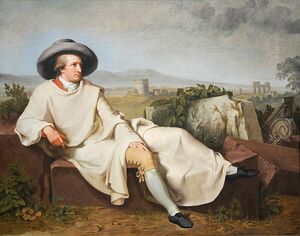Johann Wolfgang von Goethe
Johann Wolfgang Goethe, (28 August 1749 – 22 March 1832), since Template:Year Johann Wolfgang von Goethe was a German poet. Following his father's wishes, he first studied law in Leipzig and Straßburg, a profession which he practised in Wetzlar and Frankfurt later. At the same time, he began his career as a poet. In 1773, Götz von Berlichingen had its premiere. In 1774, his "Leiden des jungen Werther" followed.
His career took him to Weimar, where he stood in the services of the duke, fulfilling political-administrative duties. There he also was the impresario of the Hoftheater (engl.:court theatre).
Inspired by his Italianreise (engl.: Italian Journey) (1786 until 1788) he finished plays like Torquato Tasso and Iphigenie auf Tauris.
The West-östlicher Divan shows his appreciation for Persian and Arabic culture, particularly that of the Persian poet Hafi.
The importance of his support of the young Schiller and lifelong exhange with the latter can hardly be overstated. The time of their collaboration is named the Weimarer Klassik (Herder und Wieland belong into this period as well). It ends with Schiller's premature death in 9. Mai 1805.
Why Goethe isn't more popular in other languages (unlike Shakespeare in the German-speaking world, for example) is probably due to the specific nature of his language and his poetry that is hard to transport in different languages. It always seems natural and specific, at the same time elegant, far less emotional and adjective-laden than Schiller – who is the master when it comes to creating an emotional connection. In his treatise Über naive und sentimentalische Dichtung, Schiller refers to Goethe as the epitome of the "naive" and himself as the "sentimental" poet - an assessment they both seemed to concur with.[1][2]
Goethe and Schiller are easily the two most renowned German poets. Goethe's Faust is still omnipresent, whether in the character of Mephisto, or terms like the "Gretchenfrage", (a question cutting right into the heart of a matter, like Margarethe's "Say, as regards religion, how you feel?"[3]. The most quoted sentence in all of Faust is probably Faust's initial resignation at the attempt to make sense of the world: "Hier steh ich nun, ich armer Thor und bin so klug als wie zuvor." ("Now here I am, a fool for sure! No wiser than I was before.")[3]
Johann Wolfgang von Goethe in Philippe Jaroussky's discography, filmography and performance history
Studio albums
| Year | Work | Studio album | With |
|---|---|---|---|
| 2021 | "Der Erlkönig" | À sa guitare (Album) | Thibaut Garcia |
On video
Concert programs
See the respective program page for a list of possible recordings.
| Year | Work | Concert program | With |
|---|---|---|---|
| 2021 ‐ 2022 | "Der Erlkönig" | À sa guitare (Concert program) | Thibaut Garcia |
Complete list of musical pieces using texts by Johann Wolfgang von Goethe
This listing only reflects the musical pieces performed by Philippe Jaroussky.
| Year published or performed | Title | Composer | Work | Album, video or concert Program | Year first published/performed |
|---|---|---|---|---|---|
| 2021 | "Der Erlkönig" | Franz Schubert | originally from: Die Fischerin | À sa guitare (Album) |
|
| 2021 ‐ 2022 | "Der Erlkönig" | Franz Schubert | originally from: Die Fischerin | À sa guitare (Concert program) |
|
References
- ↑ "Johann Wolfgang von Goethe". Archived from the original on October 4, 2021. Retrieved October 4, 2021.
- ↑ "T. J. Reed: Weimar Classicism: Goethe's Alliance with Schiller. In: Lesley Sharpe (Hrsg.): The Cambridge Companion to Goethe. Cambridge University Press, Cambridge 2002, S. 103". Wikipedia. Archived from the original on October 4, 2021. Retrieved October 4, 2021.
- ↑ 3.0 3.1 Kline, A. S. (2003). "Johann Wolfgang von Goethe, Faust Parts I & I". Archived from the original (PDF) on October 4, 2021. Retrieved October 4, 2021.
